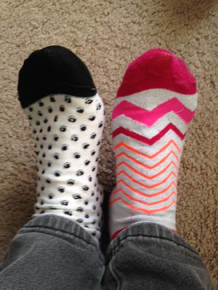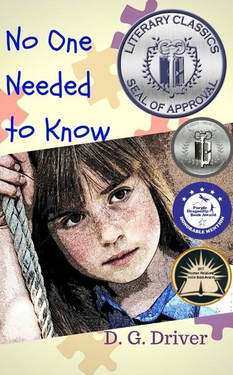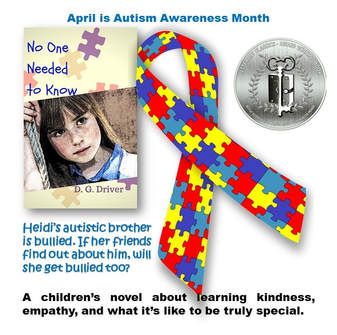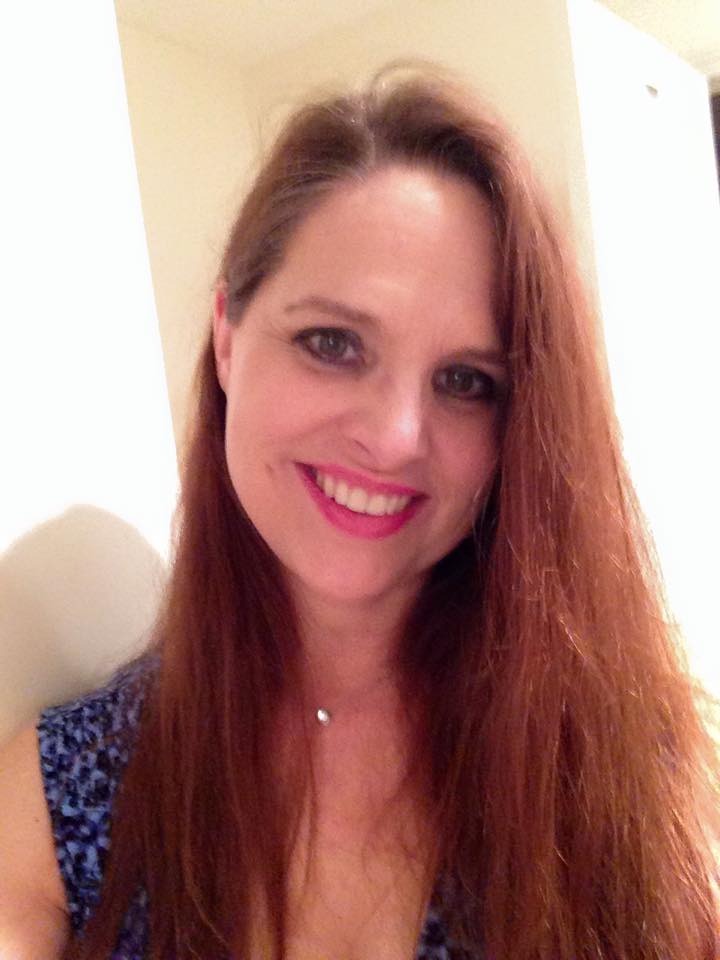 It's Down Syndrome Awareness Day! I wore mismatched socks to show my solidarity, and now I want to share a little excerpt of my novel No One Needed to Know with you - a scene that includes an adorable high school girl with Down Syndrome. But before I do... I've written here and on other blogs a lot about how my novel was inspired by the relationship I had with my oldest brother when we were kids. I haven't written a lot about how some of my experiences as a teacher shaped the book as well. To supplement my acting career after I graduated from college, I became a substitute teacher in Special Education classes. I started with preschool children, then worked at a school with blind autistic children, and ultimately got a full time job at a private school for children with learning disabilities. When I went back to work after my daughter was born, I worked with special needs children at an elementary school in Tennessee and eventually got hired at an inclusive child development program in Nashville for children birth through 5 that helps special needs and medically fragile children alongside their typically developing peers. I've been there almost 13 years now. In other words, I've worked with a lot of children from 6 months through 12 years old with challenges, including several sweet Down Syndrome babies that I have loved with all my heart.  In No One Needed to Know, my main character Heidi attends a dance at a bowling alley that is a fundraiser for her brother's high school special education program. She meets his friends and learns a lot more about them and her brother during this experience. (My brother used to be in a group that went bowling regularly, and this scene is based on that.) Heidi is inspired by the dance to figure out how to teach the rude and mean-spirited kids at her own school more about kids with special needs in hopes it'll make them kinder. The setting and characters of the final chapters of the book are stolen straight out of my earliest teaching memories. This is from Chapter 12 "The Dance", well over half-way through the story.  Due to the fact that everyone in the group was so different from each other, I was desperate to know which disabilities Donald’s friends had. My mom told me I wasn’t allowed to ask that. She said it was rude. “Just talk to everyone like they’re no different from you or me.” “But Mom, I just want to know the condition—” “I’ll make you sit outside on a bench all evening if I hear you asking anyone,” she said. Dad backed her up with some extra warnings of his own. I thought they were being pretty ridiculous, and the questions burned on my tongue all evening with each person I met. Donald’s best friend (whom I didn’t know existed) was a guy named Peter. Even though he had the ability to recite the first five pages of The Hobbit by heart, I had to walk this hulking, six-foot-three boy to the bathroom because he couldn’t understand the directions. I also had to keep him from biting his left hand, which was permanently scarred from his front teeth. What kind of disability was that? Was it like Donald’s but way more intense? Then there was this other boy named Kincaid. He was on the small side, almost as short as me, so I took him to be a freshman. This boy twitched, barked, and swore alternately, particularly when he got nervous. What caused a person to do that? I met a few kids who looked like some characters I’d seen on TV. Their faces were round and their eyes small. One of them, a girl named Kathryn, was very cheerful and was excited about the e-reader she recently got for her birthday. In a thick voice that was sometimes hard to understand, she told me several times that she could enjoy all the popular books now because she could make the font big enough to read. When I knew my mom wasn’t in earshot, I asked her, “Do you have trouble reading because of your. . .?” I let it dangle on purpose, hoping she’d finish my sentence for me. “Oh, yes,” she said, nodding enthusiastically. “My Down Syndrome makes my eyes have trouble.” She pointed at another girl who was walking by. “Claire has a hard time reading, too, but that’s because she’s mentally retarded.” “Wait. You actually called her ‘retarded’?” I whispered the last word, afraid to say it all the way out loud. It didn’t matter, though. Claire heard us anyway. Claire stopped in her tracks and began to shout at Kathryn and me. “I’m not retarded! I’m not! Shut up, Kathryn! I don’t like that!” Ms. Anderson, my brother’s Life Skills teacher, rushed over to us, put her hands on Claire’s shoulders, and led her out of the party room. Kathryn and I followed her out to the main lobby where we found Ms. Anderson saying some quiet, soothing words near Claire’s ear. It took a minute to calm her down because Claire kept shouting things like, “She’s not supposed to say that! You said she couldn’t say that!” Their teacher said some more things that I couldn’t hear over the music playing, but after a moment Claire quit raging and lifted her tear-streaked face to Kathryn. “Say you’re sorry.” “I’m sorry,” Kathryn said easily enough. “Want to go bowl?” Then they took hands and strolled away together like nothing happened. I imagined going up to Cathy and ordering her to say she was sorry for blabbing about my brother to Jackie and the others and ruining my life. How awesome would it be if she just did it and then we wandered off from the other girls at recess to play handball and laugh with each other like old times? Ms. Anderson was about to walk away, and that snapped me out of my ridiculous daydream. I skipped up beside her and touched her shoulder to get her attention. “Why did Kathryn call that girl retarded? Isn’t that a bad word?” Ms. Anderson smiled gently at me. The lines around her eyes deepened in a way that let me know she smiled more than she frowned. I would think her life would be very hard working with these special needs teenagers all the time, but her bright eyes and laugh lines suggested otherwise. “We’re all pretty sensitive about that word being used incorrectly. There is, in fact, a condition that goes by that name, but we prefer to say ‘developmentally disabled’ or ‘developmental delayed’. A little more eloquent, don’t you think?” I liked the way she spoke to me in a light voice that made her words very clear but didn’t make me feel like she was treating me like I was a baby. How long did it take her to perfect that style of speaking? I wondered whether that was how she talked to my brother and his friends. It would be hard to talk to them like normal teenagers, wouldn’t it? So many of them sounded like little kids. I agreed. “My mom said I couldn’t ask about what’s wrong with everyone here.” She winced. “We’re also pretty sensitive about saying something’s ‘wrong’ with our friends here.” “Oh. Sorry.” “Look, I see that you’re interested in learning something, but I can’t go into specifics about everyone’s different diagnosis. There are confidentiality laws . . .” “I understand,” I told her. Right then I heard a cheer from one of the bowling lanes. I followed the sound to find Donald, Peter, and two other boys cheering about someone’s score with their arms raised over their heads. Donald and Peter did an awkward high five. I wondered what the score could be. “Great job, Donald!” Ms. Anderson shouted. “Donald?” I guess the shock in my voice came out a little more than I expected because Ms. Anderson patted me on the shoulder and said, “Your brother is a pretty good bowler. The best in the group by far.” “Really?” I could hardly believe it. My awkward brother? “I can barely pick up a bowling ball, let alone score well.” “Donald just might surprise you sometimes, I think.”  I hope you enjoyed that little piece of my story. You can learn a more about No One Needed to Know by visiting the page on my website. It's available in print at Amazon. The book shares some insight on several kinds of special needs, although the main focus is autism. If you order a copy today, you'll have it in plenty of time to read in April - Autism Awareness Month! I'm always happy to read your comments or answer your questions. All the best to you! Comments are closed.
|
D. G. DriverAward-winning author of books for teen and tween readers. Learn more about her and her writing at www.dgdriver.com Archives
July 2024
Categories
All
|
Author D. G. Driver's
Write and Rewrite Blog
“There are no bad stories, just ones that haven’t found their right words yet.”
A blog mostly about the process of revision with occasional guest posts, book reviews, and posts related to my books.

 RSS Feed
RSS Feed